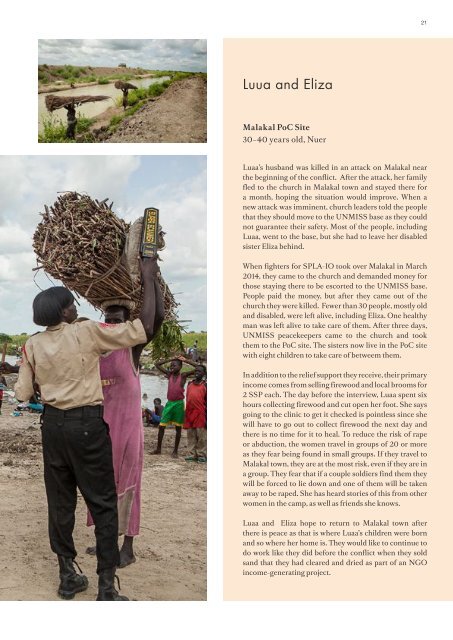Lessons Learned from South Sudan Protection of Civilian Sites 2013–2016
1rTWN7V
1rTWN7V
Create successful ePaper yourself
Turn your PDF publications into a flip-book with our unique Google optimized e-Paper software.
21<br />
Luua and Eliza<br />
Malakal PoC Site<br />
30–40 years old, Nuer<br />
Luaa’s husband was killed in an attack on Malakal near<br />
the beginning <strong>of</strong> the conflict. After the attack, her family<br />
fled to the church in Malakal town and stayed there for<br />
a month, hoping the situation would improve. When a<br />
new attack was imminent, church leaders told the people<br />
that they should move to the UNMISS base as they could<br />
not guarantee their safety. Most <strong>of</strong> the people, including<br />
Luaa, went to the base, but she had to leave her disabled<br />
sister Eliza behind.<br />
When fighters for SPLA-IO took over Malakal in March<br />
2014, they came to the church and demanded money for<br />
those staying there to be escorted to the UNMISS base.<br />
People paid the money, but after they came out <strong>of</strong> the<br />
church they were killed. Fewer than 30 people, mostly old<br />
and disabled, were left alive, including Eliza. One healthy<br />
man was left alive to take care <strong>of</strong> them. After three days,<br />
UNMISS peacekeepers came to the church and took<br />
them to the PoC site. The sisters now live in the PoC site<br />
with eight children to take care <strong>of</strong> betweem them.<br />
In addition to the relief support they receive, their primary<br />
income comes <strong>from</strong> selling firewood and local brooms for<br />
2 SSP each. The day before the interview, Luaa spent six<br />
hours collecting firewood and cut open her foot. She says<br />
going to the clinic to get it checked is pointless since she<br />
will have to go out to collect firewood the next day and<br />
there is no time for it to heal. To reduce the risk <strong>of</strong> rape<br />
or abduction, the women travel in groups <strong>of</strong> 20 or more<br />
as they fear being found in small groups. If they travel to<br />
Malakal town, they are at the most risk, even if they are in<br />
a group. They fear that if a couple soldiers find them they<br />
will be forced to lie down and one <strong>of</strong> them will be taken<br />
away to be raped. She has heard stories <strong>of</strong> this <strong>from</strong> other<br />
women in the camp, as well as friends she knows.<br />
Luaa and Eliza hope to return to Malakal town after<br />
there is peace as that is where Luaa’s children were born<br />
and so where her home is. They would like to continue to<br />
do work like they did before the conflict when they sold<br />
sand that they had cleared and dried as part <strong>of</strong> an NGO<br />
income-generating project.


